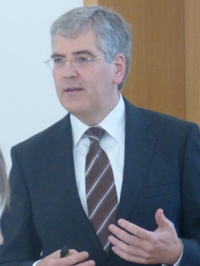 On October 25, Andreas Barckow, President of the Accounting Standards Committee of Germany (DRSC), gave a SAFE Policy Lecture on Accounting and Financial Stability. He was introduced by Günther Gebhard, Emeritus Professor of Accounting and Auditing at Goethe University Frankfurt. Barckow gave an insight into the new standard IFRS 9 of the International Accounting Standards Board (IASB) with respect to financial instruments. This standard was originally aimed at reducing complexity before its focus was changed to provide a technically robust solution due to the financial crisis.
On October 25, Andreas Barckow, President of the Accounting Standards Committee of Germany (DRSC), gave a SAFE Policy Lecture on Accounting and Financial Stability. He was introduced by Günther Gebhard, Emeritus Professor of Accounting and Auditing at Goethe University Frankfurt. Barckow gave an insight into the new standard IFRS 9 of the International Accounting Standards Board (IASB) with respect to financial instruments. This standard was originally aimed at reducing complexity before its focus was changed to provide a technically robust solution due to the financial crisis.
According to Barckow, the conventional accounting framework was criticized as being insufficient subsequent to the financial crisis. As a consequence, the IASB established a new standard, the IFRS 9, based on an expected loss model instead of the incurred loss model presently used. Barckow explained that the incurred loss model only refers to the past so that future payments are not taken into account and therefore no risk provisioning is made for prospective losses. In contrast, the expected loss model is forward looking and future payments are discounted back to the reporting date so that expected losses are provided automatically within IFRS 9. Barckow clarified that expected losses can only be calculated by a fair value measurement and that the impairment model is inherently linked to a measurement attribute.
Furthermore, Barckow set forth that accounting principles were originally not established as a basis of decision-making for regulatory actions but as an instrument to inform market participants about the economic situation of a company. As a result, accounting numbers could be used for counter-check but not as the only basis for regulatory action.
He concluded that even though accounting and regulatory reporting are connected, one should refrain from using the accounting standards for meeting financial stability goals.

